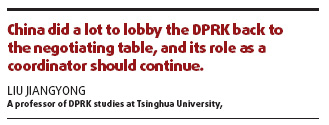Asia-Pacific
Setting a date next step to bring DPRK to Six-Party Talks
(China Daily)
Updated: 2009-12-16 09:52
 |
Large Medium Small |
Jingle bells are welcoming US special envoy Stephen Bosworth, who is flying back home after a week-long Asian trip.
The 70-year-old has a good reason to celebrate. During his visit to the Democratic People's Republic of Korea (DPRK), the country said it is willing to rejoin the Six-Party Talks, although the timetable is still up in the air.

To push Pyongyang back to the negotiating table, which it walked away from in April, Washington made at least one compromise. It agreed to resume discussions on a peace treaty, a deal that Pyongyang has long wished for. But that discussion has been shelved since 1999.
| ||||
Bosworth's "ice-breaking" visit brings an end to nearly a year of the political tension on the Korean Peninsula, coupled with saber-rattling and economic sanctions, Liu Jiangyong, a professor of DPRK studies at Tsinghua University, told China Daily.
The first official encounter between Pyongyang and the Barack Obama government "is a good beginning in the right direction", he said.
The outcome came after trump cards from both sides - nuclear tests by the DPRK and sanctions by the US - failed to work earlier this year, said Shen Shishun, a senior researcher at China Institute of International Studies. Both nations then started testing the waters and reapproaching each other amid domestic and international pressure.
The last round of Six-Party Talks, which groups the DPRK, the US, China, Russia, the US and the Republic of Korea (ROK), was held in Beijing late last year.
Apart from the US, the ROK has also signaled goodwill to the DPRK recently, a change of its hard-line policy since President Lee Myung-bak took office last year.
The two countries last week sent a joint team to survey industrial parks in China and Vietnam, as part of the efforts to enhance the operation of their joint industrial park in Kaesong.
Seoul will send antiviral drugs worth more than $15 million this week to help Pyongyang fight an outbreak of H1N1 flu, officials said yesterday. The DPRK has agreed to receive the supplies at a border road crossing, the ROK's unification ministry said.
"All parties came to know tit-for-tat cannot solve the problem," Liu said.
"Six Party Talks are likely to resume sometime next year," said Liu, who believed talks participants may have already begun to consult on a date.
However, not all are optimistic.
"Uncertainty always looms on the peninsula," said Yang Xiyu, an expert of DPRK studies at China Institute of International Studies, especially when peace treaty negotiations begin along with Six-Party Talks.
A peace agreement would replace an armistice to formally end the 1950-1953 Korean War. The treaty talks included Pyongyang, Seoul, Beijing and Washington.
"It's now a matter of two sets of talks. Things get complicated, and we really cannot tell when talks could be restarted," Yang said.
Another researcher said the good will between the US and the DPRK could only be temporary.
"Both are buying time," said Shi Zhan, from China Foreign Affairs University.
Washington is grappling with the financial crisis, the contentious healthcare reform and wars in Afghanistan and Iraq, while Pyongyang is dealing with domestic tension resulted from its currency reform to increase control on its economy.
Earlier this month, the DPRK revalued its currency, the won, to tame inflation, which some analysts said could hit up to 30 percent. But residents complained the revamp, which asked them to swap limited amount of old bills at 100:1, wiped out their savings.
The incident appeared to help push the DPRK to soften its tone.
But "if things go in favor of any one of them in future, it could turn tough against the other", Shi said.
"Major differences remain between the US and the DPRK," said Zhang Liangui, an expert on the DPRK at the Central Party School in Beijing.
Washington wants to denuclearize the DPRK, but the DPRK wants the US to sign a peace pact. "The matter of which comes first will push the talks into deadlock again," he said.
"The talks will be tortuous," he said.
Experts urged China to play a role to narrow down the differences.
"China did a lot to lobby the DPRK back to the negotiating table, and its role as a coordinator should continue," Liu said.
He was referring to a flurry of visits made by Chinese officials including Premier Wen Jiabao and Defense Minister Liang Guanglie to the DPRK since the latter declared the Six-Party Talks was "dead" earlier this year.
"Now China's job is to work with others to fix a date of the talks and try to avoid another breakup," he said.










